What is the book about?
This guide is produced in partnership with Blue Peter.
Finding Her Feet, written by Eve Ainsworth and illustrated by Luna Valentine, is the second title in the Blue Peter Book Club.
The book is about a shy, talented footballer called Lily and her challenge to overcome her anxiety and feel like she fits in. Lily's talent takes her on a journey with a local football team, where she learns to navigate school and team friendships. Finding Her Feet is packed with interesting facts about the history of women's football.
You can get a sneak peek of the book over on Blue Peter.
Lily always felt a bit left out, especially at school, where all the other girls seemed so confident.
That's until her P.E teacher spots her natural talent on the football pitch and invites her to join the local girls' team.
Just as Lily finally feels like she's fitting in, an argument with her team mates puts everything at risk.
Can Lily carry on playing the game she loves?
How does the author tell a story and give information?
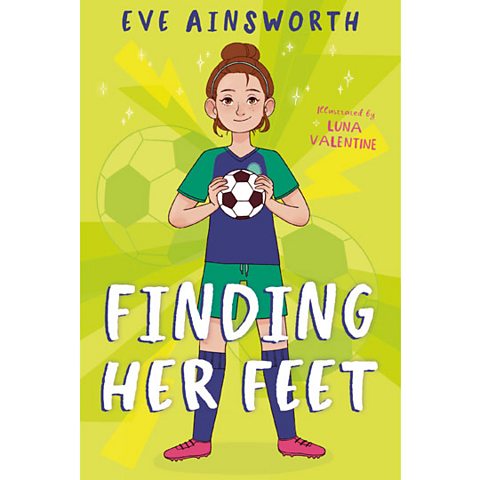
In Finding Her Feet, the author, Eve Ainsworth, uses a clever writing technique where she switches from fictionWriting that is partly imaginative/made up. (story-telling) to non-fictionWriting that only uses facts (things that have happened or are true). (fact sharing) in the same chapter.
She provides both information about women’s football, as well as a brilliant page-turning story!
Have you seen this writing style used in any other books you have read?
The information shared about the development of women's football over the last 100 years cleverly matches the ups and downs of Lily's story; from starting out, facing difficulties and finally playing her first match.

Read this excerpt from the book.
Is this an example of fiction or non-fiction writing?
"…in 1921, the FA made the brutal decision to ban all women's football…"
This excerpt is a fact.
It's an example of non-fiction writing.
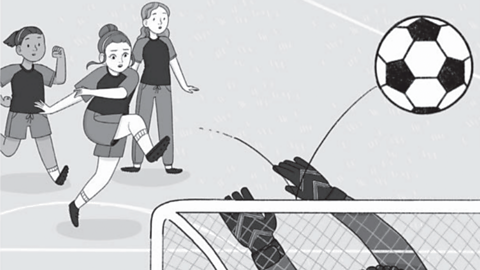
Find out more about writing fiction and non-fiction with this KS2 English Bitesize guide.
What are metaphors and how have they been used for description?
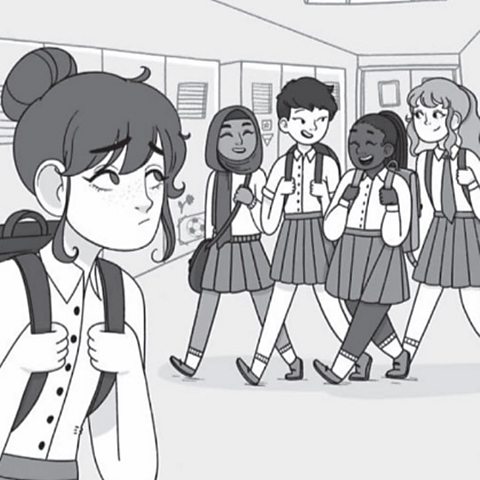
One of the writing methods used in Finding Her Feet are metaphorA way of describing something by saying it is something else. It's not actually true but it gives the reader a clearer idea of what it is like.. This is when the author tries to create an image in your mind to describe how the characters in the story are feeling.
In Finding Her Feet the author uses metaphors effectively to explain how the characters are feeling.
"She thought about how her stomach always twisted in knots when she worried about coming to school."
Of course, this doesn't mean her stomach is actually twisted in knots. Instead, it's a way of showing that Lily was incredibly nervous and unsettled when she worried about school.
Explore metaphors further with this KS2 English Bitesize guide.

How has the author used hyperbole to emphasise and exaggerate?
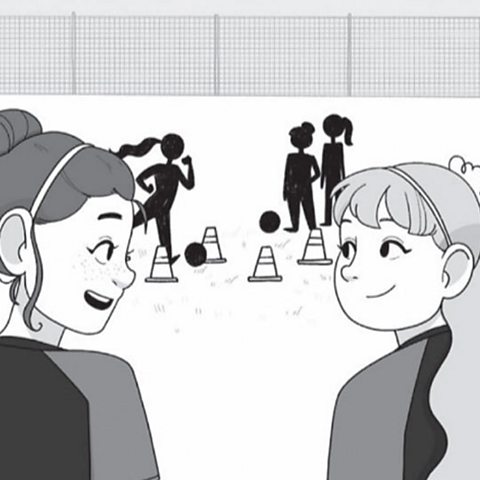
hyperboleIt is used to exaggerate and emphasise different ideas in your writing - it's not meant to be taken literally. makes your writing more interesting and entertaining, especially when you're writing a story (fiction).
It's a descriptive writing method that you can use to exaggerate and emphasise different points or ideas in your writing.
Eve Ainsworth, the author of Finding Her Feet uses lots of hyperbole to describe the character's feelings and actions.
"Emma was beaming from ear to ear."
Emma's smile can't actually stretch from one ear to the other. However, by using hyperbole, it's clear to the reader that Emma is happy because her smile was very big!
Remember:
Hyperbole isn't meant to be understood exactly (literally) as it's written.
You can learn more about hyperbole with this Bitesize guide.
What's an asterisk and how's it used to move time forward?

You will notice that this symbol * is used a few times throughout the story.
This (*) is called an asterisk. It can be used in different ways depending on the writing style you're using.
"And where was Beth? Why wasn't she in school?
*
Back at home that evening, Lily felt like she couldn't face the rest of the team at training."
Here, the author uses the asterisk to show that Lily was at school, but time has moved on and now she's at home.
You can use this in your writing to quickly move your story on. This allows you to link two events, but also means that you don't have to write a detailed description of what happened in the time between those two events.

However, be careful!
Using an asterisk too much in your writing can make it too short and snappy, so that it sounds like a robot has written it.
Activity 1
Activity 2
Activity 3

Using your non-fiction writing skills, can you write a recount about one of these key events in the history of Women's football?
- 1969: The formation of the Women's Football Association (WFA).
- 1972: The first ever England's Women's International match.
- 1991: The start of the Women's Football Association League.
- 1991: The introduction of the FIFA Women's World Cup.
You might have to do some research before you start writing. You can use books, newspapers or the internet to help you.
Before you start writing, you might find this guide about writing recounts helpful.

Play our fun English game Crystal Explorers. gamePlay our fun English game Crystal Explorers
Use grammar, punctuation and spelling skills to explore jungles, caves and tombs on your mission!

More on Blue Peter Book Club
Find out more by working through a topic
- count4 of 13

- count5 of 13
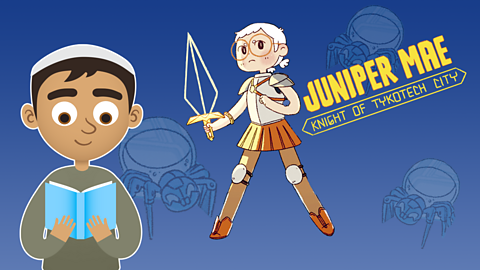
- count6 of 13

- count7 of 13
